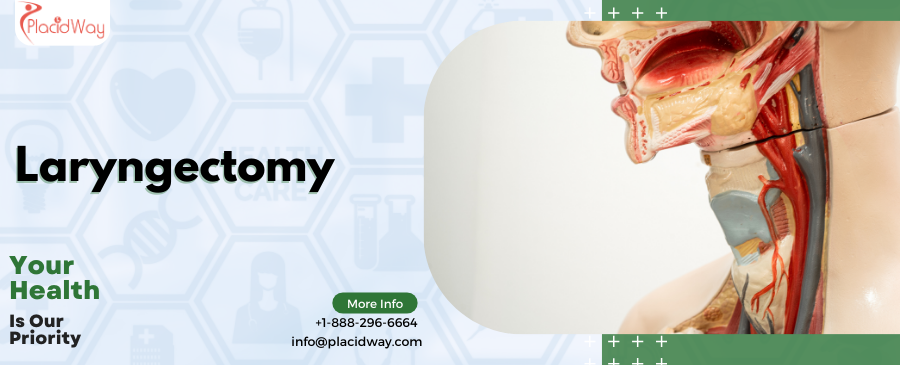
Navigating Laryngectomy Surgery: Your Guide to Healing and Hope
Facing a diagnosis that may require a laryngectomy can be overwhelming. This significant surgical procedure involves the removal of the larynx, or voice box, often as a life-saving measure against laryngeal cancer. It’s a decision that impacts not only physical health but also profoundly changes how a person breathes, speaks, and interacts with the world. Understanding what a laryngectomy entails, why it’s performed, and what life looks like afterward is crucial for both patients and their loved ones.
Many individuals seeking advanced medical care, particularly for complex procedures like a laryngectomy, are increasingly looking beyond their borders. Medical tourism offers a pathway to high-quality treatment, potentially reduced costs, shorter wait times, and access to specialized surgeons and state-of-the-art facilities that may not be readily available in their home country. This comprehensive guide will walk you through everything from the symptoms that lead to this procedure and its causes, to the types of surgery, recovery expectations, and how to successfully navigate the journey of seeking laryngectomy care abroad.
We understand that terms like "throat cancer surgery," "larynx removal," or "voice box surgery" often appear in online searches when people are trying to grasp the severity and implications of their condition. Our goal is to provide clear, empathetic information to help you make informed decisions about your health and treatment options, whether at home or through international medical care.
What are the common symptoms that may lead to a Laryngectomy?
Recognizing the early signs of laryngeal cancer, which often necessitates a laryngectomy, is critical for timely diagnosis and treatment. While these symptoms can be caused by less serious conditions, their persistence warrants immediate medical evaluation. Patients often search for "throat cancer symptoms" or "hoarse voice warning signs" when these issues arise.
- Persistent Hoarseness or Voice Changes: This is the most common and often earliest symptom. A voice that remains hoarse or changes in quality for more than two weeks, without a clear reason like a cold, should be investigated.
- Difficulty Swallowing (Dysphagia): Feeling like food is getting stuck, pain when swallowing, or a persistent sensation of a lump in the throat.
- Breathing Problems (Dyspnea): As the tumor grows, it can obstruct the airway, leading to noisy breathing or shortness of breath.
- Persistent Sore Throat or Cough: A sore throat that doesn't go away, or a chronic cough, especially with blood, can be a sign.
- Lump in the Neck: A palpable lump in the front of the neck, which might be a swollen lymph node or the tumor itself.
- Ear Pain: Pain in one ear, particularly if persistent and not associated with an ear infection, can be referred pain from the larynx.
- Unexplained Weight Loss: Significant, unintentional weight loss can be a general symptom of advanced cancer.
What causes laryngeal cancer and increases the risk for Laryngectomy?
Laryngeal cancer develops when cells in the larynx grow abnormally, forming a tumor. Understanding the risk factors helps in prevention and early detection. Patients often search for "causes of throat cancer" or "risk factors for voice box cancer."
- Tobacco Use: Smoking cigarettes, cigars, or pipes, and using smokeless tobacco, is the single greatest risk factor. The chemicals in tobacco damage the cells lining the larynx, leading to cancerous changes.
- Excessive Alcohol Consumption: Heavy and prolonged alcohol use significantly increases the risk, especially when combined with tobacco use. Alcohol and tobacco have a synergistic effect, meaning they multiply each other's risks.
- Human Papillomavirus (HPV) Infection: Certain strains of HPV, particularly HPV-16, are increasingly linked to laryngeal cancers, similar to their role in cervical and oral cancers.
- Exposure to Certain Chemicals: Prolonged exposure to substances like asbestos, sulfuric acid mist, and nickel can increase risk.
- Gastroesophageal Reflux Disease (GERD): Chronic acid reflux can irritate the larynx, potentially contributing to cellular changes over time, though this link is less direct than tobacco or alcohol.
- Poor Nutrition: A diet lacking in fruits and vegetables may also play a role.
- Family History: While less common than with other cancers, a family history of head and neck cancers might indicate a genetic predisposition.
What types of Laryngectomy procedures are available to patients?
The type of laryngectomy performed depends on the size, location, and spread of the cancer. The goal is always to remove all cancerous tissue while preserving as much function as possible. Patients often inquire about "partial vs total laryngectomy" or "types of voice box surgery."
- Total Laryngectomy: This is the most extensive procedure, involving the complete removal of the larynx. The trachea (windpipe) is then redirected to an opening in the neck called a stoma, through which the patient breathes permanently. The esophagus is separated from the airway, and the patient will no longer be able to speak using their vocal cords.
- Partial Laryngectomy: This procedure involves removing only a portion of the larynx, aiming to preserve some speaking and swallowing functions. Several types exist:
- Supraglottic Laryngectomy: Removes the upper part of the larynx (above the vocal cords).
- Hemilaryngectomy: Removes one side of the larynx, including one vocal cord.
- Supracricoid Laryngectomy: Removes the vocal cords and the cartilage above and below them, while preserving the cricoid cartilage and sometimes one arytenoid cartilage, allowing for a connection between the remaining airway and esophagus.
The choice of procedure is a complex decision made by a multidisciplinary team of specialists, in consultation with the patient, considering the cancer's stage, the patient's overall health, and potential post-operative quality of life.
Who is considered an eligible candidate for Laryngectomy surgery?
Laryngectomy is a major surgery, and not everyone is a suitable candidate. The decision is based on a thorough medical evaluation. People often ask "who needs laryngectomy" or "when is voice box removal necessary."
- Advanced Laryngeal Cancer: The primary indication is the presence of laryngeal cancer that is locally advanced, has recurred after radiation therapy, or is too large to be effectively treated by less aggressive means, such as radiation or chemotherapy alone.
- Overall Health Status: Patients must be healthy enough to undergo a lengthy and demanding surgery, as well as tolerate the recovery period. This includes assessing cardiovascular, pulmonary, and renal function.
- No Distant Metastasis: Generally, laryngectomy is performed when the cancer is confined to the larynx and nearby lymph nodes, without having spread to distant organs (distant metastasis).
- Commitment to Rehabilitation: Patients must be prepared for the significant changes in breathing, swallowing, and speaking that follow the surgery and be willing to engage in extensive rehabilitation, including speech therapy.
- Lack of Response to Other Treatments: Sometimes, laryngectomy is a salvage procedure when initial treatments like radiation and chemotherapy have failed to control the cancer.
What should I expect during Laryngectomy recovery and what is the typical timeline?
Recovery from a laryngectomy is a significant journey that requires patience and dedication. It's not just about physical healing but also adapting to a new way of life. Patients often search for "laryngectomy recovery time," "life after laryngectomy," or "how to speak after voice box removal."
- Immediate Post-Operative Period (Hospital Stay: 1-3 weeks):
- Breathing Tube (Tracheostomy): Immediately after surgery, you will breathe through a temporary tube in the stoma. This will later be replaced by a smaller tube or simply managed by covering the stoma.
- Feeding Tube: A temporary feeding tube (nasogastric or gastrostomy) will be in place for nutrition and hydration until swallowing function safely returns, usually within 1-2 weeks.
- Pain Management: Pain will be managed with medication.
- Wound Care: The surgical site will require careful cleaning and dressing changes.
- Speech Therapy: Early introduction to a speech-language pathologist to discuss communication options.
- Home Recovery (Weeks to Months):
- Stoma Care: Learning to clean and manage the stoma is crucial to prevent infections and keep the airway clear.
- Swallowing Rehabilitation: Gradual reintroduction of oral feeding, often starting with liquids and progressing to solids, under the guidance of a therapist.
- Speech Rehabilitation: This is a major part of recovery. Patients will learn alternative ways to speak, such as:
- Tracheoesophageal Puncture (TEP) with Voice Prosthesis: A small surgical opening between the trachea and esophagus, fitted with a valve that allows air to be directed to create sound.
- Esophageal Speech: Learning to trap and release air in the esophagus to create sounds.
- Electrolarynx: A battery-operated device held against the neck that produces a vibratory sound.
- Psychological Adjustment: Adapting to changes in body image, communication, and daily activities can be challenging. Support groups and counseling are often beneficial.
- Long-Term Adjustment: Most patients adapt well to their new normal, leading fulfilling lives. Regular follow-ups are essential to monitor for recurrence and manage any long-term effects.
What are the potential risks and long-term side effects of Laryngectomy?
Like any major surgery, a laryngectomy carries inherent risks. Beyond the immediate surgical complications, there are significant long-term effects that patients must be prepared for. Patients often search for "laryngectomy complications" or "side effects of voice box removal."
Surgical Risks (Short-term):
- Infection: At the surgical site or stoma.
- Bleeding: During or after surgery.
- Fistula Formation: An abnormal connection between the pharynx (throat) and the skin, which can leak saliva and increase infection risk.
- Wound Breakdown: Issues with the healing of the surgical incision.
- Breathing Problems: Obstruction of the stoma or respiratory complications like pneumonia.
- Swallowing Difficulties: Even after the feeding tube is removed, some patients may experience ongoing issues.
- Nerve Damage: Can affect shoulder or neck movement.
Long-term Side Effects:
- Permanent Loss of Natural Voice: This is the most profound change, requiring new communication methods.
- Permanent Neck Stoma: Patients will breathe through an opening in their neck, which needs daily care.
- Changes in Smell and Taste: With altered airflow through the nasal passages, senses of smell and, consequently, taste can be diminished.
- Difficulty Swallowing: Some patients may experience chronic dysphagia, requiring dietary modifications.
- Dry Mouth: Due to radiation therapy (if administered) or changes in salivary gland function.
- Neck Stiffness or Pain: From surgery and/or radiation.
- Psychological and Emotional Impact: Depression, anxiety, and social isolation are common, requiring strong support systems and possibly counseling.
- Reduced Sense of Safety in Water: Activities like swimming become dangerous due to the open stoma.
How much does Laryngectomy surgery cost globally, and why consider it abroad?
The cost of a laryngectomy can be a significant concern for many patients, especially in countries with high healthcare expenses or limited insurance coverage. This is a primary driver for people searching for "laryngectomy cost abroad" or "affordable throat cancer surgery."
Worldwide Cost Comparison for Laryngectomy (Estimated Ranges):
| Country | Estimated Cost Range (USD) | Notes |
|---|---|---|
| United States | $60,000 - $150,000+ | Highest costs, extensive post-op care included. |
| United Kingdom | $40,000 - $90,000+ | Varies between NHS (free) and private care. |
| India | $15,000 - $25,000 | Highly competitive prices, excellent facilities. |
| Turkey | $18,000 - $30,000 | Growing medical tourism hub, modern hospitals. |
| Mexico | $20,000 - $35,000 | Proximity for North American patients, good quality. |
| Thailand | $20,000 - $35,000 | Renowned for patient care and hospitality. |
*Note: These are estimated ranges and can vary significantly based on the type of laryngectomy (partial vs. total), hospital choice, surgeon's fees, duration of stay, and inclusion of pre/post-operative care, rehabilitation, and voice prosthetics.
Why Consider Laryngectomy Surgery in Another Country?
- Significant Cost Savings: As seen above, costs can be dramatically lower in popular medical tourism destinations, often without compromising on quality.
- Access to Specialized Expertise: Some countries are home to world-renowned surgeons and specialized centers for head and neck cancers, offering cutting-edge techniques and extensive experience.
- Reduced Wait Times: In countries with universal healthcare, wait lists for complex surgeries can be long. Traveling abroad often means quicker access to necessary treatment.
- Advanced Technology and Facilities: Many international hospitals catering to medical tourists boast state-of-the-art equipment and modern infrastructure.
- Privacy and Anonymity: For some, undergoing such a profound procedure away from home offers a sense of privacy.
Which countries are top destinations for high-quality, affordable Laryngectomy?
When seeking laryngectomy care abroad, identifying reputable destinations is key. Patients often search for "best countries for throat cancer treatment" or "top hospitals for laryngectomy."
- India: Known for its highly skilled surgeons, world-class multi-specialty hospitals, and very competitive pricing. India offers comprehensive care, including advanced surgical techniques and extensive rehabilitation services.
- Turkey: Emerging as a major medical tourism hub, Turkey provides modern facilities, accredited hospitals, and experienced ENT (Ear, Nose, and Throat) surgeons. Its strategic location also makes it accessible for patients from Europe, Asia, and Africa.
- Thailand: Celebrated for its exceptional patient care, hospitality, and internationally accredited hospitals. Thailand combines high-quality medical services with a recovering environment.
- Mexico: A popular choice for North American patients due to its geographical proximity. Mexico offers high-quality care in cities like Tijuana, Guadalajara, and Monterrey, often at a fraction of U.S. costs.
- South Korea: While potentially higher in cost than other Asian destinations, South Korea is a leader in medical innovation and technology, with highly advanced hospitals and renowned specialists.
These countries not only offer significant cost advantages but also uphold high standards of medical care, often adhering to international accreditation bodies like JCI (Joint Commission International).
What can I expect when traveling for Laryngectomy surgery in another country?
Traveling for a complex procedure like a laryngectomy involves careful planning and understanding of the process. Patients often search for "medical tourism process for laryngectomy" or "preparing for surgery abroad."
- Initial Consultation and Medical Review: This often starts remotely. You'll submit your medical records, pathology reports, and imaging scans for review by the international medical team. They will determine your eligibility and propose a treatment plan.
- Personalized Treatment Plan and Quote: Once deemed eligible, you'll receive a detailed treatment plan, including the type of laryngectomy, expected duration of stay, and a comprehensive cost estimate covering surgery, hospital stay, medications, and sometimes even initial rehabilitation.
- Travel and Accommodation Logistics: A medical tourism facilitator, like PlacidWay, can assist with visa requirements, flight bookings, and arranging accommodation for you and your companion. They can also help with local transportation.
- Pre-Operative Appointments: Upon arrival, you'll undergo in-person consultations with your surgeon, anesthesiologist, and other specialists, along with necessary pre-surgical tests.
- The Surgery and Hospital Stay: Expect a hospital stay of 1 to 3 weeks, focusing on immediate recovery and stabilization.
- Post-Operative Recovery and Rehabilitation: This is a crucial phase. You'll likely need to stay in the country for several additional weeks (totaling 3-6 weeks or more for the entire trip) to allow for initial healing, wound care, stoma management training, and intensive speech and swallowing therapy.
- Language and Cultural Support: Many medical tourism providers offer translation services and cultural guidance to ensure a comfortable experience.
- Follow-up Care: Discuss arrangements for post-treatment follow-up and how your local doctors can collaborate with the international team.
How can I ensure safety and quality, and find patient success stories when choosing Laryngectomy care abroad?
The safety and quality of care are paramount when considering surgery abroad. Furthermore, hearing from others who have successfully navigated this journey can provide immense reassurance. Patients often look for "safe laryngectomy abroad," "accredited hospitals international," or "laryngectomy patient reviews medical tourism."
Ensuring Safety and Quality:
- Choose Internationally Accredited Hospitals: Look for hospitals with international accreditations, such as Joint Commission International (JCI). This signifies that the facility meets rigorous international standards for patient care and safety.
- Verify Surgeon Credentials: Research your surgeon's qualifications, experience (especially with laryngectomies), board certifications, and professional affiliations. Don't hesitate to ask for their CV or patient testimonials.
- Utilize Reputable Medical Tourism Facilitators: Companies like PlacidWay specialize in connecting patients with vetted international providers, helping to ensure quality, manage logistics, and offer a layer of advocacy.
- Understand the Treatment Plan: Ensure you receive a clear and detailed treatment plan, including all expected procedures, potential risks, and post-operative care. Ask questions until you fully understand.
- Check for Comprehensive Support: A good medical tourism package should include support for language barriers, accommodation, transfers, and post-operative follow-up.
- Emergency Preparedness: Understand the emergency protocols of the hospital and country, and ensure your travel insurance covers medical emergencies abroad.
Finding Patient Success Stories:
- Medical Tourism Platforms: Reputable platforms often feature patient testimonials, video interviews, and detailed case studies from individuals who have undergone laryngectomy abroad. These provide first-hand accounts of their experiences, from initial consultation to recovery.
- Online Forums and Support Groups: Joining online communities for laryngectomy patients or medical tourism can offer insights and direct contact with others who have traveled for treatment.
- Clinic/Hospital Websites: Many leading international hospitals showcase patient stories and before-and-after photos (with consent) to highlight their expertise and patient outcomes.
- Ask Your Facilitator: Your medical tourism facilitator can often provide references or connect you with former patients who are willing to share their experiences.
Hearing about successful outcomes and the positive experiences of others can be incredibly empowering and help alleviate concerns, showing that a fulfilling life is possible after laryngectomy, even when seeking care far from home.
Take the Next Step with PlacidWay
Ready to explore treatment options abroad? Discover top clinics, compare prices, and get a free quote tailored to your needs with PlacidWay.





.png)
.png)
.png)
.png)

Share this listing